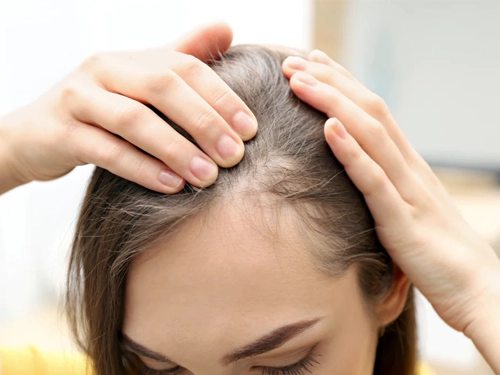
Female pattern hair loss (FPHL), the medical term for hair loss in women, can be upsetting and have an impact on one's self-esteem. In contrast to male pattern baldness, female pattern baldness usually manifests as a scalp thinning that preserves the frontal hairline. This comprehensive essay will examine the various therapies available for women who are experiencing hair loss, as well as the causes and diagnosis.
For a diagnosis, a complete medical history, a scalp examination, and occasionally blood tests or a scalp biopsy are necessary. Dermatologists are qualified to identify the type and cause of hair loss.
Women who have hair loss, a disorder that can greatly affect their quality of life and self-esteem, have a variety of underlying causes, from lifestyle choices to heredity. Although there are surgical treatments, non-surgical techniques are preferred by many women because they are less invasive and have a lower risk profile. This thorough guide explores the plethora of non-surgical hair loss treatments accessible to women, going into each one's compatibility, application, and effectiveness.
Minoxidil (Rogaine): The most well-known topical medication approved by the FDA for female pattern hair loss is minoxidil (Rogaine). It inhibits baldness and promotes hair growth. To observe benefits, minoxidil must be applied consistently for several months.
PRP entails extracting a patient's blood, enriching it with platelets, and administering an injection into the scalp. It's thought to promote blood flow to the hair follicle, which in turn promotes natural hair growth.
Women who experience hair loss, a disorder that has significant emotional and psychological ramifications, are increasingly investigating cutting-edge therapies such as stem cell therapy. The most innovative of these, Stromal Vascular Fraction (SVF) therapy, uses stem cells and is becoming more and more popular as a treatment for female hair loss. This comprehensive essay will examine in-depth SVF therapy, elucidating its mechanism, procedure, efficacy, and appropriateness for females going through hair loss.
Stem Cell Therapy (SVF): What Is It?
A type of regenerative medicine called stromal vascular fraction therapy makes use of the patient's own adipose-derived stem cells. Mesenchymal stem cells, which have the capacity to regenerate and repair tissues, are among the many cell types included in this rich mixture of cells that have been extracted from the patient's body fat.
The SVF Therapy Process
Effectiveness Stem Cell Therapy (SVF) for Hair Loss Treatment in Women
It is thought that SVF treatment encourages hair regrowth by:
Research and Evidence
SVF therapy is a relatively new treatment, thus additional research is need to definitively confirm its success, despite its promise. While preliminary research and anecdotal accounts have yielded promising effects, longer-term results and standardised techniques remain to be investigated.
Suitability and Safety
Who is a Good Candidate for Stem Cell Therapy (SVF)?
Certain types of female hair loss may make them good candidates, especially if they have enough donor fat for the operation. In situations when hair follicles are totally nonexistent or in areas that are totally bald, it is less successful.
Safety and Side Effects
Since stem cell therapy utilizes the patient's own cells, there is very little chance of allergic responses. The injection and extraction methods do, however, include some risk, just like any other surgery.
Comparing SVF Therapy to Other Treatments
Comparing SVF therapy to conventional therapies, a new strategy is provided. Because it addresses hair loss at the cellular level, it may be more comprehensive. Nevertheless, the cost is frequently higher and a surgical operation is needed to retrieve fat.
SVF therapy is a potentially useful option for women who have not responded well to conventional medications for hair loss. It is a promising new development in the field. But given that clinical research on this treatment is still in its early stages, it's critical to approach it with cautious optimism. Women who are interested in SVF therapy should speak with a regenerative medicine professional about their suitability, possible dangers, and anticipated results. SVF therapy may develop into a more well-known weapon in the fight against female hair loss as the field progresses, giving hope to individuals looking for alternatives to conventional therapies.
Certain light wavelengths are used by LLLT in an apparent attempt to promote hair growth. It comes in a variety of forms, including as salon treatments, helmets, and combs.
A cosmetic surgery that replicates the natural appearance of hair follicles by applying natural colors at the scalp's epidermal level. This may give the impression that your hair is fuller.
Frequent scalp massages might promote hair development by increasing blood flow to the scalp. It has also been demonstrated that essential oils like rosemary and peppermint oil may help to stimulate hair growth.
Although many people benefit from these therapies, their efficacy varies depending on the condition and cause of hair loss in each individual. Before beginning any treatment, it is imperative to explore potential adverse effects and combinations with other medications with a healthcare provider.
In summary
Women can choose from a variety of non-surgical hair loss treatments, including topical treatments, medicines, lifestyle modifications, and cutting-edge therapies like PRP and LLLT. An appropriate diagnosis, early intervention, and a customized treatment regimen are essential for treating hair loss. It's also critical to keep reasonable expectations in mind and acknowledge that individual outcomes can differ greatly. Many women experience notable changes in their general quality of life and hair health when they adopt the appropriate technique.
Women's hair loss is a complex problem with many potential reasons. A comprehensive strategy that incorporates lifestyle modifications, medicinal interventions, and occasionally surgical choices can alleviate symptoms and enhance the state of affairs. It's critical that ladies who are experiencing hair loss speak with a healthcare professional to figure out the best course of action for their particular needs and health.
Numerous reasons, such as hormonal shifts (such as those during menopause or pregnancy),stress, some drugs, underlying medical disorders, genetic factors, and nutritional deficiencies, can contribute to hair loss in women.
Indeed, there are treatments available for a variety of female hair loss conditions. The underlying reason and kind of hair loss determine how effective a treatment is.
Topical minoxidil (Rogaine),laser therapy, hormone therapy (if an imbalance in hormones is a cause),and in certain circumstances, hair transplant surgery are the available treatments.
Indeed. Hair loss may result from a diet deficient in important nutrients such as iron, protein, vitamins, and minerals.
Indeed, telogen effluvium, a form of hair loss in which hair stops growing and finally falls out, can be brought on by high amounts of stress.
Under this situation, hair stays in the telogen phase, or resting phase, and sheds more readily. It can be brought on by sickness, stress, or hormone fluctuations and is frequently transient.
Natural treatments for hair loss, such as scalp massages, peppermint oil, and rosemary oil, may strengthen hair, but their efficacy in treating hair loss is less established than that of medicinal interventions.
Minoxidil contributes to thicker hair strands by enlarging hair follicles and extending the hair growth phase.
Indeed, hormonal imbalances resulting from thyroid problems, menopause, or polycystic ovarian syndrome (PCOS) can cause hair loss.
In female pattern baldness, where women inherit genes that cause hair thinning from either parent, genetics can play a significant influence.
Although they are often more appropriate for women with specific patterns of hair loss—such as those whose hair is thinning mostly on top of the scalp—hair transplants can be beneficial.
Indeed, as part of the normal hair growth cycle, it's typical to lose between fifty and one hundred hairs per day.
More than 100 hair loss each day, obvious thinning, bald patches, or an expanding portion are among the warning signs.
Yes, certain behaviors such as tight hairstyles, overuse of heat styling tools, and harsh chemical treatments can cause hair loss and breaking.
If you think your current shampoo is too harsh, it might be helpful to switch to a soft, nourishing shampoo.
Indeed, unlike female pattern baldness, which causes hair loss gradually, alopecia areata is an autoimmune disorder that causes patchy hair loss.
Lowered estrogen levels are a typical cause of postpartum hair loss, albeit it's usually only temporary.
The best approach to find out the type and reason of your hair loss is to see a dermatologist.
Yes, different treatments may be prescribed based on menopause-related hormonal changes.
If nutritional inadequacies are the cause of hair loss, supplements may be able to help. Iron, zinc, biotin, and vitamin D are common supplements.
Although there isn't a single vitamin that may stop hair loss, deficiencies in biotin, vitamin D, and iron can help maintain the health of your hair.
Although they may stimulate hair growth and improve blood flow to the scalp, scalp massages are not a stand-alone treatment for hair loss.
Even though there is no cure for all types of hair loss, there are ways to help, such eating a balanced diet, controlling your stress, and avoiding harsh hair treatments.
How long does it take to see results from hair loss treatments?
Due to the sluggish process of hair development, it typically takes many months to detect an improvement.
Can birth control pills cause hair loss?
Hormonal changes caused by taking or discontinuing birth control tablets might cause hair loss in certain women.
Is hair coloring or bleaching harmful for hair loss?
Regular bleaching or dyeing of the hair can weaken it and perhaps promote hair loss.
How does menopause affect hair loss in women?
Because of a drop in estrogen and progesterone, menopause can cause thinning hair.
Can certain hairstyles cause hair loss in women?
Yes, traction alopecia, a kind of hair loss, can be brought on by tight hairstyles like braids or ponytails.
What is the prognosis for women with hair loss?
Depending on the underlying reason, the prognosis varies, however many forms of hair loss are curable or self-limiting.
Should I see a doctor for hair loss?
Yes, it's advisable to see a dermatologist if you're worried about hair loss in order to identify the source and the best course of action.
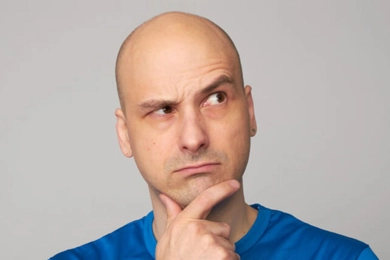 Causes of Hair Loss in Man
Causes of Hair Loss in ManA sizable percentage of males suffer from hair loss, a normal yet frequently upsetting condition. This thorough book explores the many factors that contribute to male hair loss, providing information and und Read More...
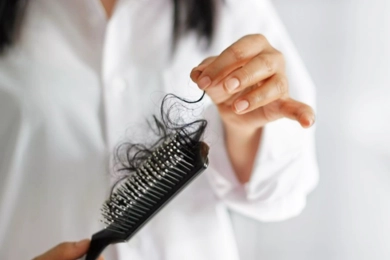 Unveiling the Mystery: Understanding Hair Loss in Women
Unveiling the Mystery: Understanding Hair Loss in WomenOur comprehensive examination of hair loss is a subject that affects a great number of women worldwide. We will examine the various complex causes of hair loss in women in this blog post, including lifestyle Read More...
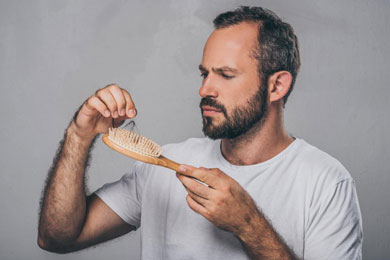 Causes, Remedies, and Prevention of Hair Loss
Causes, Remedies, and Prevention of Hair LossFor both men and women, experiencing hair loss can be upsetting. Numerous factors, such as genetics, hormonal changes, medication, illness, and inadequate nutrition, can cause it. Read More...
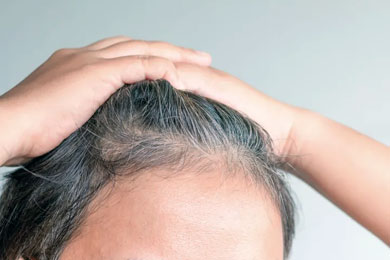 Stress, Anxiety And Hair Loss: Are They Related?
Stress, Anxiety And Hair Loss: Are They Related?Millions of people around the world struggle with the common problem of hair loss. Many people wonder if anxiety and psychological stress can also cause hair loss, which can be brought on by numerous factors Read More...